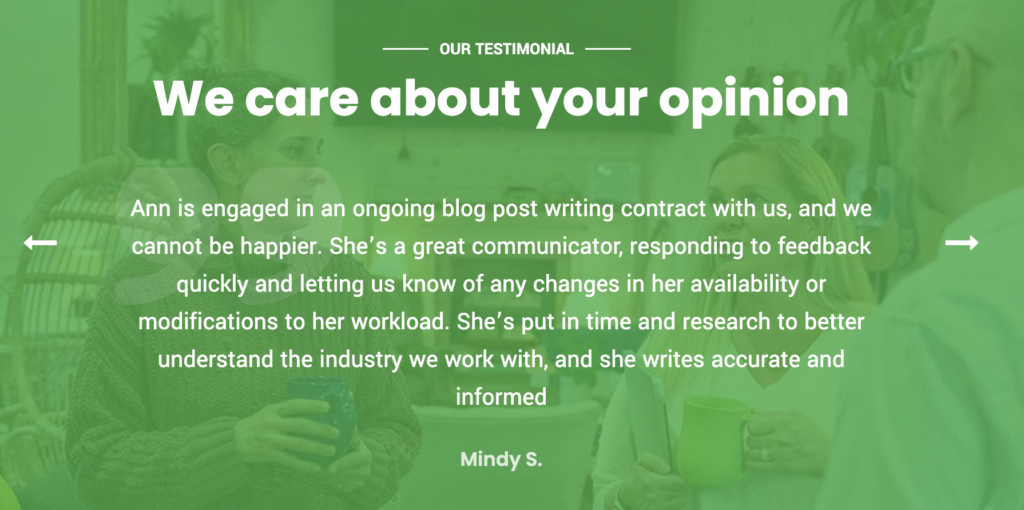
When I look back on that very first year as a copywriter and content writer, I realize that aside from the writing and client management, I had no idea what I was doing. I was positive that all I really needed to do was keep my profile fresh and up to date on Upwork, and I’d be good to go. But I was so wrong.
If you’ve been following along in this blog series, you know that I figured many things out the hard way. And much of it was due to my ignorance. I just thought if I had the chops to provide excellent written content to my clients, that’s all I needed.
Let’s Recap Those Year One Business Mistakes
At this point, you know how wrong I really was. I paid for a crappy website. Big mistake. Huge.
I didn’t have a contract in place for my non-Upwork clients. This was a huge mistake, even more so! Was I charging what I was worth? Nope, and I can’t even imagine how much that cost me that first year of business.
I didn’t spend enough time on lead generation, mistakenly assuming the work would continue. I didn’t buy business liability insurance. Who knows what I was thinking back then, but the truth was that I wasn’t thinking of insurance at all. Ouch.
I waited too long to get all my channels up and active on social media. And I know better! I’m a marketer and have been in the space since before social media was even a thing. Yikes. Did I just really say that?
Then, I didn’t practice what I preach as I failed to post to my own blog regularly. I’m still trying to get better at this, but there are only so many hours in the day. I know, I know, not a good excuse. And then, of course, I made that artificial intelligence blunder.
So why am I recapping all of this for you? First, I want to make sure you are still with me here because if you are an aspiring copywriter or content writer, this really is for your eyes and ears. But also, because all of this leads up to my next mistake—not building business partnerships.
Now, to be fair, most small business owners don’t build business partnerships right off the bat. So, this isn’t necessarily something you would do in the inaugural year of business anyway. But it’s something to plan for, so I felt like it was worth including in this series.
What is a Business Partnership?
In the writing business—at this point, I don’t think I need to keep throwing it in your face that I am both a copywriter and a content writer—it takes time to build a client roster, develop trust, create happy customers, and then put together that portfolio. For that reason, business partnerships aren’t necessarily going to come flying in.
But, as I said before, you need to plan for this. Without great business partners, you may be losing out on a highly valuable and profitable business stream. And I’m not just talking about those partners that will pay you referral commissions. Of course, that’s a nice-to-have and definitely something to add to your business bucket list, but for now, let’s focus on the partnerships that add value to your clients.
When you put your clients’ needs first, you create convenience for them, and they’ll be more likely to bring you new work. Why? You are saving them time and money by providing connections and recommendations that they don’t have to keep hunting for on their own.
Consider this scenario—you’re having coffee with a prospective client who wants to hire you to write a blog for them on a weekly basis. Awesome! This is excellent news. But then you go to their website. And it’s awful. The site takes forever to load, the imagery is blurry and outdated, and the content is bad. Really, really bad. So what do you do?
As a writer, do you really want to create fantastic content for your clients only to direct readers to a poor website experience? Of course not. What if you could pass your client over to one of your business partners who can work some magic behind the scenes to fix all that technical SEO stuff and improve the user experience? Your client will love you for it!
The Best Business Partners for Business Writers
Okay, so you want to know what business partners you should entertain for your business. And really, the world is your oyster. You can develop as many business partners as you want. But I advise you to start where you can add the most value to your clients. Think about it from the perspective of what your client needs to do to make sure that the content you write for them will give them the most bang for the buck.
I suggest you start here. Establishing these five partnerships will grow your credibility with your current and future clients. Trust me on this.
1. Social Media Agency
Social media is non-negotiable for businesses, especially when people are spending 143 minutes a day on social media. Imagine that—143 minutes per day! I’m in the content business and can’t imagine spending that much time on social platforms.
But, partnering with a social media agency allows you to offer clients more than just written content—you’re helping them engage with their audience, build brand awareness, and drive traffic to their site. And, if you are writing blogs for businesses, they should be sharing out that content on their social media channels. So, this is a win-win for you and your clients.
What to Look For in a Social Media Partner:
- Creativity: Can they craft engaging, relevant posts?
- Analytical Skills: Are they data-driven and capable of measuring success?
- Reliability: Will they consistently meet deadlines and maintain a regular posting schedule?
2. SEO and Website Development Agency
Your written content is only as good as the website it lives on. Partnering with an SEO and website development agency makes sure that your clients’ websites look great and are also optimized for search engines. This way, the great content you create has the best chance of being found and appreciated by the target audience. When your client sees their content rising to the top of search engine results pages, they’re more likely to hire you for more and more.
What to Look For in an SEO and Website Development Agency:
- Technical Expertise: Do they understand both front-end and back-end development?
- SEO Knowledge: Are they up to date with the latest SEO practices?
- User Experience Focus: Can they create a website that’s easy to navigate and fast to load?
3. Fractional CMO
Some of your clients might have the resources to tackle marketing tactics but don’t know how to develop a cohesive strategy. This is where a fractional Chief Marketing Officer (CMO) can be invaluable. And fractional CMOs are becoming increasingly popular for companies that don’t have the funds to allocate to a full-time resource.
They can help your clients develop a marketing plan that aligns with their business goals. And your content becomes that much more effective.
What to Look For in a Fractional CMO:
- Strategic Thinking: Can they see the big picture and guide long-term planning?
- Industry Experience: Do they have a proven track record in your client’s industry?
- Communication Skills: Are they able to translate complex marketing strategies into actionable steps?
Beware on this one, however, as there are a lot of people out there in the remote workforce that call themselves fractional CMOs but really fon’t have the street credibility to do so. Be sure to do your homework and avoid imposter fractional CMOs.
4. Graphic Designer
As you know, I have been using the Upwork platform for quite some time to help with lead generation and introductions to prospective clients. And when scrolling through potential gig opportunities, I am always surprised by how many clients are looking for someone who can both write content and create graphics to support the written content.
Yes, some writers can do this. But in most cases, this is an entirely different skill set. Trust me, you don’t want me to try to create visuals for you. I promise it would be a very bad investment. But, your clients will appreciate it if you have a graphic design partner that can manage that part of the project for you. And this means you can win more gigs.
What to Look For in a Graphic Design Partner:
- Creativity: Do they have a strong portfolio that depicts their design skills?
- Versatility: Can they work across different mediums and styles?
- Collaboration: Are they open to feedback and able to work seamlessly with your writing?
5. Video Production Specialist
While written content is super important and there will always be a need, laying in video content to a marketing strategy is where its at. And many clients have no idea how to find a great video specialist that can provide them with high-quality videos to help them promote their business.
As video content continues to dominate online platforms, having a video production specialist as a partner can really up your game. They can help your clients create engaging video content that complements the written work you provide. And remember, video content can create a serious lift in email click through-rates to the tune of 300%. Your clients may also see an 80% increase in conversion rates when videos are used on a landing page. And, if that doesn’t sell you on the need for a video partner, consider that an estimated 64% of consumers make a purchase after consuming a video. Those are some pretty powerful stats if you ask me.
What to Look For in a Video Production Partner:
- Technical Proficiency: Do they have the right equipment and editing skills?
- Storytelling Ability: Can they turn concepts into compelling visual narratives?
- Adaptability: Are they capable of producing different types of videos, from promotional clips to explainer videos?
How to Get the Best Business Partners For Your Writing Business
Now that you know the types of partners you want for your writing business, let’s talk about how to get them in the first place. And the guidance I’m about to give you may surprise you. Getting great business partners starts with you, not them.
Here’s why.
Just like you don’t want to partner with someone who walks a good walk and talks a good talk but can’t deliver, they don’t want that either. So, you need to be able to provide proof that you are as good at what you do as you say you are. This is exactly why you won’t likely be able to get those partners right away in that first year of business. It takes time.
You need to build up clientele. You probably need some bylined gigs as well as the ghost-writing gigs that likely comprise most of your business. People need to see your work in multiple places, not just on your website. So, here’s what to do to build that street credibility.
1. Get Bylined Gigs
Getting your name attached to your work is like getting a golden ticket in the writing world. Bylined gigs are the ones that say, “Hey, look at me, I actually wrote this!” They give you credibility and visibility that ghostwriting simply can’t. I was fortunate when I first got going in the writing space to have the opportunity to write bylined work for big sites such as FinImpact, Healthday, and Host Advice.
Start by pitching to smaller publications or niche blogs in your field. Don’t be afraid to reach out to editors or even start with guest posts. The more bylined work you have, the easier it will be for potential partners to see you as a legitimate player in the writing game.
Tactics:
- Start Small: Target smaller blogs or publications first.
- Pitch Regularly: Consistent pitching increases your chances of landing bylined work.
- Show Off Your Bylines: Add these pieces to your portfolio and share them on social media.

2. Ask for Reviews
Reviews are like gold stars for your business. But here’s the thing—they don’t magically appear. You have to ask for them. Start by setting up a Google My Business profile if you don’t have one already. This gives potential clients an easy way to find you and read what others have to say about your work. Then, make it a habit to ask satisfied clients for reviews. The key is to make it easy for them—send a quick email with a direct link to your profile and a polite request.
Tactics:
- Create a Google My Business Profile: It’s free and gives your business more visibility.
- Make the Ask: Don’t be shy—most happy clients are willing to leave a review if you ask.
- Follow Up: If someone promises a review but doesn’t deliver, a gentle reminder can go a long way.
3. Ask Clients for Testimonials
So, before I get into this one, let me clarify that reviews and testimonials are not one and the same though many people use the phrasing interchangeably. The key difference here is that you go out and ask for testimonials, usually for the purpose of sharing them from your website and other marketing materials. You can see examples of testimonials for my business on the bottom of the homepage on my website.
Testimonials are powerful because they’re like little endorsements from real people who have worked with you. Don’t wait for clients to offer them—be proactive. Ask your happiest clients for a few sentences that highlight what they liked about your work. Then, display these testimonials in a big way on your website, social media, and even in your email signature if you like.
Tactics:
- Be Specific: Ask clients to focus on particular aspects of your work.
- Make it Easy: Provide a template or specific questions to guide them.
- Show off Your Testimonials: Display them on your website, in proposals, and on social media.

4. Author Guest Posts
Guest posting is a great way to introduce yourself and your business to a new audience. Not only does it give you bylined work, but it also helps with your SEO by creating valuable backlinks to your website.
Plus, it positions you as an expert in your field, which is exactly what potential partners want to see. When writing guest posts, aim for high-quality content that offers real value to the audience. When I first started writing guest posts to link back to my site, I worked with sites such as Copywriter Collective and Blog Herald (for the latter, I actually worked with the site to create a backlink to my site in their existing content).
Tactics:
- Target Relevant Blogs: Choose sites that align with your niche.
- Include a Link: Make sure your post includes a link back to your site.
- Repurpose Content: Use the guest post to fuel your own blog or social media channels.
- Seek Out Press and Publication Opportunities
5. Seek Out Press and Publication Opportunities
Last but not least, one of the best ways to gain visibility and credibility is by seeking out press opportunities, like interviews and podcasts. Getting featured in the media can position you as an expert in your field and put your name in front of a wider audience.
Start by reaching out to industry-related podcasts or online publications that interview professionals in your niche. Being a guest on a podcast or being interviewed for an article not only highlights your expertise but also helps you build your brand and connect with new audiences. I’ve had great luck with media sites such as CanvasRebel, VoyageMinnesota, and BOLD Journey. I’ve even invested marketing dollars to be featured on sites such as Women’s Herald, NY Weekly, and in a pretty cool article about the Top 20 Women Leaders To Look Out For In 2024.
I have also hopped on the opportunity to participate in podcasts. I have been featured on Time For You and Ask a Fractional. And, I’m looking for more podcast opportunities so if you know any, send them my way! It takes an army, right?
Tactics to Find Press Opportunities:
- Identify Relevant Opportunities: Look for podcasts, blogs, or online magazines that focus on your industry.
- Pitch Yourself: Craft a compelling pitch that explains why you’d be a great guest or interviewee.
- Leverage Exposure: Share the interview or podcast episode on your website and social media to maximize the visibility and credibility it brings.

Promoting Your Business Partnerships
Before we wrap up this post on Mistake #9 and my failure to develop business relationships sooner than I did, let’s talk about how you should be talking about those partnerships. But before we do that, here are a few things to consider before you get too far along:
- Review Their Portfolio: Check out the work your potential partner has done. Is it up to the standard you would expect? Does it align with the quality you deliver?
- Look at Their Reviews: Just like you ask for reviews from your clients, see what others are saying about your potential partner. Are their clients raving about them, or are there red flags?
- Assess Their Online Presence: How do they promote themselves? Are they active on social media, and do they portray their work effectively? This can give you insight into how they might promote your partnership.
- Ask for References: Don’t be afraid to ask them for a couple of client references. A good partner will be happy to share.
- Test a Small Project: Consider doing a small project together before fully committing. This can give you a feel for how they work and how well you collaborate.
- Check Their Communication Style: Are they responsive and clear in their communication? Effective communication is key to any successful partnership.
- Evaluate Their Reliability: Do they meet deadlines and follow through on commitments? Reliability is a must for a strong business relationship.
Once you’ve done your homework and feel confident in your potential partner, it’s time to start promoting that partnership. Whether it’s on your website, in your marketing materials, or during networking discussions, showing off these relationships can grow your credibility and offer more value to your clients.
Tips to Promote Your New Business Partnerships
Here’s how to make the most of it… and be sure that if you do this for your partners, that they do the same for you.
- Feature Them on Your Website: Dedicate a section of your website to highlight your business partners, explaining how your collaboration benefits your clients. I actually added a partners page where I can share my growing list of business partners.
- Include Them in Marketing Materials: Add mentions of your partnerships in brochures, flyers, and other promotional materials to flaunt—okay, flaunt might not be the best choice of words, but you get my point—the added value you bring.
- Share on Social Media: Post about your partnerships on social media, tagging your partners and explaining the mutual benefits of your collaboration.
- Mention in Networking Events: Bring up your partnerships during networking events and discussions to demonstrate the breadth of services you can offer.
- Add to Your Email Signature: While this idea isn’t one that I love, I have seen other writers include a brief mention or link to their partnerships in their email signatures. This might be something that resonates with you, and if so, go for it!
- Collaborate on Content: You’re a writer, so work with your partners on joint blog posts, webinars, or podcasts to cross-promote your services and reach a wider audience.
- Use Testimonials: If your partners are willing, include their testimonials about your collaboration on your website and marketing materials to reinforce the strength of your relationship.
Breaking Up With a Bad Business Partner
Okay, I’ll be honest. I really debated talking about this but decided to share some words. Sometimes, you make a bad partnership decision. I’ve done it, too, and have been faced with cleaning up the mess of my mistake. No, I’m not going to talk about this as Mistake #10 in my series, but I will tell you this—if things aren’t going well, you need to take action. The last thing you want is to have a business partner that isn’t cutting it. This can threaten your business reputation and work against you—big time.
Here’s what to do:
- Share Your Concerns: Have an open conversation with your partner, explaining the issues and giving them a chance to resolve the situation.
- Set a Time Limit: Make the resolution time-bound so the situation doesn’t drag on indefinitely.
- Probationary Period: If they resolve the issues, treat the next few weeks as a probationary period to see if things improve.
- If Issues Persist: If the problems reoccur or aren’t resolved, it’s time to consider ending the partnership.
- Quit While the Going is Good: Don’t wait until things get worse—act quickly to protect your business and reputation. The longer you wait, the more damage you can do.
Mistake # 9 is a Wrap
I’ve learned a lot about business partnerships over the last year and a half since starting my business officially in March 2023. I’m currently looking for some new partners, and I am planning to cut my losses on another. It’s part of the business. But, when you take the time to develop relationships it can really help your business grow. So, don’t hesitate to start looking for the right business partners for you.
Speaking of which, if you are looking for a content writer or copywriter to add to your business partner list, let me know! I’d love to meet and write great content for you and your clients! Contact me today.

